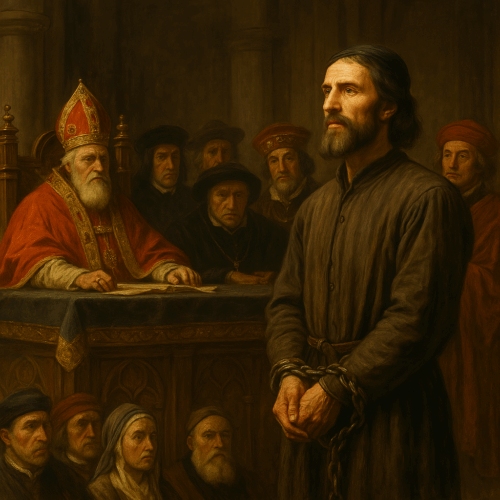A single act of conscience can reverberate through centuries. On July 6, 1415, Jan Hus, a Czech theologian and reformer, stood unwavering at the stake in Constance, Germany, refusing to abandon his call for moral renewal within the Church. His death ignited a movement that would ripple into the Protestant Reformation and reshape the trajectory of Western thought. Yet beyond its sweeping historical impact lies a practical testament: cultivating integrity and courage is as vital now as it was in Hus’s day.
In this deep dive, we’ll explore Hus’s life, his bold ideas, the drama of his trial and the fiery end that transformed him into a martyr. Then we’ll extract concrete lessons you can apply today—complete with detailed action steps, a 30-day integrity challenge and motivational insights designed to light your own flame of conviction.
- Jan Hus: From Humble Origins to Voice of Reform
Jan Hus was born around 1372 in the rural village of Husinec, Bohemia (modern Czech Republic). The son of a miller, he grew up in a devoutly Catholic household. Destitute families often sent promising children to monasteries or cathedral schools. By his teens, Hus had earned a scholarship to Prague’s Charles University, a vibrant center of medieval scholarship and political tension.
At Charles University, Hus majored in liberal arts before pursuing theology. He absorbed the writings of Augustine, Aquinas—and, crucially, the translations of John Wycliffe, an English cleric who challenged papal authority and advocated Scripture in the vernacular. Wycliffe’s radical ideas found fertile ground in Bohemia, where resentment simmered against the wealth flowing from local parishes to Rome. Hus emerged as a powerful orator, fluent in Latin and Czech, capable of bridging academic discourse and common speech.
As a preacher at the Bethlehem Chapel in Prague, he attracted crowds exceeding 2,000 on Sundays—unprecedented for the era. He decried simony (the sale of church offices), the astronomical fees for indulgences and the moral laxity of many clergy. Though still a priest, he insisted that every Christian held equal access to God’s word. His followers dubbed him “the morning star of Rome’s reformation.”
 Theological Reforms: Scripture, Conscience and Accountability
Theological Reforms: Scripture, Conscience and Accountability
Hus’s writings crystalized around three transformative principles:
- Scripture Over Tradition
He argued that the Bible, not papal decrees or church councils, held supreme authority. Translating key passages into Czech, he empowered laypeople to interpret Revelations independently. - Universal Conscience
Every believer, from peasant to prelate, possessed a conscience guided by Scripture. Ethical conduct was not reserved for clergy; it was a universal duty. Hus’s sermons stressed that a church’s legitimacy depended on spiritual purity, not hierarchical rank. - Rejection of Financial Abuses
The church’s indulgence system—selling forgiveness of sins—became Hus’s primary target. He viewed it as both unbiblical and exploitative, siphoning wealth from the poor and breeding cynicism toward genuine piety.
In his masterwork, De Ecclesia (“On the Church”), Hus contended that a true church was a spiritual body rooted in Christ’s teachings, not a wealthy institution. He wrote with fervor: “If we should see an angel preach contrary to Scripture, let us reject him.” This radical insistence that conscience could supersede clerical edicts fueled both admiration and outrage among contemporaries.
- The Journey to Constance: Trust and Betrayal
The early 15th century backdrop was a fractured Christendom. Two rival popes, one in Rome and one in Avignon, undermined papal legitimacy. Emperor Sigismund convened the Council of Constance (1414–1418) to heal the Great Schism and address church corruption. Despite warnings, Hus agreed to appear under imperial safe conduct, convinced his arguments would secure reform.
In November 1414, he departed Prague surrounded by supporters chanting “Truth and Faith.” His entourage delayed at Schwäbisch Hall, debating scripture with professors. But upon arrival in Constance, church officials reneged on the guarantee. Arrested by masked guards, Hus was thrust into a dank tower cell beneath the episcopal palace. For nine months, he endured freezing dampness, meager rations and isolation from friends.
Through barred windows he continued writing—treatises on the Eucharist, papal authority and clerical purity. His captors forbade his Czech scribe, yet Hus persisted, dictating in Latin to visiting scholars. Word of his confinement spurred letters from Prague clergy urging moderation, but Hus remained resolute: conscience could not bow to coercion.
 Trial and Martyrdom: The Unyielding Stand
Trial and Martyrdom: The Unyielding Stand
By spring 1415, the council’s patience wore thin. Presiding cardinals demanded Hus recant specific propositions they labeled heretical—most notably his view that indulgences lacked scriptural basis. For weeks, theologians pressed him with texts, councils and canon law. Hus responded with calm logic: “Whatever I have written contrary to Scripture, let it be condemned.”
On June 5, delegates pronounced him a heretic. Stripped of clerical status, he was handed over to secular authorities. King Sigismund, though initially sympathetic, acquiesced to the council’s verdict. Publicly scourged and shorn of his religious garb, Hus was paraded through Constance’s streets, a human spectacle warning all who dared dissent.
At dawn on July 6, 1415, in the bustling marketplace, he was bound to a wooden stake. With a prayer on his lips, he forgave his persecutors and implored passersby to pursue spiritual renewal. Torchbearers lit the faggots at his feet. Witnesses described his face as serene, even as flames consumed him. His ashes were cast into the Rhine River—ironically scattering the seeds of reform downstream.
 Aftermath in Bohemia: From Mourning to Mobilization
Aftermath in Bohemia: From Mourning to Mobilization
When news of Hus’s execution reached Prague, grief erupted into defiance. University students refused to attend lectures, clergy closed several churches in protest and townsfolk bore black arm bands. Radical priests began offering communion in both kinds—the cup and the wafer—which had been reserved for priests alone.
By 1419, Hussite militias—led by the charismatic Jan Žižka—seized control of Tabor, a fortified town named after the biblical hill. They innovated the war wagon tactic: converting wagons into mobile fortresses, bristling with guns and crossbows. Over the next decade, the Hussites repelled five crusades launched by the papacy and the Holy Roman Empire. Their cause blended religious zeal with Czech nationalism, asserting both spiritual and national self-determination.
Internal divisions eventually splintered the movement into moderate Utraquists and radical Taborites, nearly derailing their victories. Yet the sheer force of their convictions forced the Council of Basel in 1436 to grant Bohemia religious concessions—communion in both kinds and the right to elect their own clergy—long before the wider Reformation unfolded.
- Long-Term Impact: A Beacon for Reformation
Jan Hus’s martyrdom echoed far beyond Bohemia. Martin Luther, two generations later, openly confessed Hus as a forerunner. Luther’s Ninety-Five Theses in 1517 revisited Hus’s critique of indulgences. When papal bull threatened Luther with excommunication in 1520, he referenced Hus’s trial as a cautionary tale against suppressing reformers.
The broader Reformation unleashed waves of religious pluralism, vernacular literacy and questioning of absolute authority—political as well as spiritual. Hus became a national icon for Czech identity in the 19th century, depicted in poetry by Karel Hynek Mácha and commemorated by a grand statue in Prague’s Old Town Square (erected 1915). His story underscored that moral integrity, anchored in conscience, could challenge even the mightiest institutions.
- Applying Hus’s Legacy: Personal Power Today
Hus’s courage wasn’t born from superhuman prowess but from deliberate choices you can replicate. Whether you face corporate injustice, social inequity or internal conflict, his example offers a blueprint to transform conviction into action.
Below are five timeless lessons drawn from his life, each paired with specific, step-by-step guidance so you can cultivate integrity and impact in your own sphere.
- Five Core Lessons and Action Steps
8.1 Detecting Institutional Disconnects
Hus saw hypocrisy when the Church’s wealth contradicted its teachings.
- Map out one organization you belong to—your workplace, club or community group.
- Note three policies or behaviors that clash with its mission statement.
- Collect tangible evidence: meeting minutes, emails or direct observations.
- Draft a brief report highlighting gaps and propose realistic improvements.
8.2 Speaking Truth to Power
Despite threats, Hus addressed emperors and bishops with respectful candor.
- Identify an authority figure—team lead, community organizer or local official—whose decisions affect you.
- Gather two data points illustrating an issue (e.g., customer complaints, financial figures).
- Script a concise request: “I appreciate X, but I’m concerned about Y because of Z. Could we explore A or B as alternatives?”
- Request a 10-minute conversation, deliver your script calmly and document their response.
8.3 Building Value-Driven Communities
Hus’s movement thrived as supporters rallied around shared principles.
- List two friends or colleagues who share one key value of yours—honesty, inclusivity, sustainability.
- Schedule a 60-minute meeting (virtual or in-person) to discuss that value’s practical application.
- Co-create a one-page pledge outlining commitments —for example, “I will speak up kindly when I see injustice.”
- Plan quarterly check-in meetings to share wins and challenges in upholding your pledge.
8.4 Embracing Strategic Sacrifice
Hus surrendered comfort and safety for a higher cause.
- Choose one daily habit you’ll swap for a value-aligned activity—social media scrolling for skill learning, solo evenings for community volunteering.
- Set a daily tracker: note whether you completed the new habit and journal one insight.
- After one week, review your journal for themes—renewed focus? heightened energy?
- Adjust the habit if needed to ensure it stretches you without overwhelming.
8.5 Turning Convictions into Projects
Hus channeled belief into writings, translations and sermons.
- Define one conviction (e.g., mental health awareness, environmental action).
- Brainstorm three project formats: blog series, video interviews, community workshops.
- Choose one format and outline five milestones—for instance, “Draft first blog post by Day 7; schedule webinar by Day 21.”
- Publicly share your timeline with your pledge group (lesson 8.3) for accountability.
 A 30-Day Integrity Challenge: Daily Blueprint
A 30-Day Integrity Challenge: Daily Blueprint
To translate these lessons into habit, embark on a structured 30-day journey. Each day has a targeted focus, actionable task and reflection prompt. Adapt the schedule to your pace but aim for daily consistency.
Days 1–3: Self-Audit and Journaling
- Task: Journal three areas in your life where actions undermine your values.
- Reflection: What emotions arise when you confront these inconsistencies?
Days 4–7: Defining Your Mission Statement
- Task: Craft a one-sentence personal mission statement that captures your top conviction.
- Reflection: How does this statement feel—empowering, challenging or both?
Days 8–10: Preparing to Speak Up
- Task: Identify one authority figure and gather supporting evidence for a respectful feedback meeting.
- Reflection: What fears surface at the thought of this conversation? How will you address them?
Days 11–14: Community Building Kick-Off
- Task: Invite two peers to a value-focused meetup. Draft your joint pledge.
- Reflection: How does collaborating influence your commitment level?
Days 15–17: Sacrifice and Swap
- Task: Choose one comfort to relinquish and replace it with a purpose-driven habit.
- Reflection: Notice shifts in your daily rhythm and mindset.
Days 18–21: Project Launch
- Task: Initiate your conviction-driven project (blog post, workshop, social media series).
- Reflection: What challenges emerge in taking the first step? How do you overcome them?
Days 22–25: Resilience and Recommitment
- Task: Revisit your mission statement. Adjust wording or intensity based on your experience so far.
- Reflection: In what ways have you grown more confident? Where do doubts linger?
Days 26–29: Sharing Your Story
- Task: Host a mini-event—online live, office presentation or small group discussion—to share your journey.
- Reflection: How does vulnerability impact connection and influence?
Day 30: Consolidation and Next Frontier
- Task: Review your journal entries and project milestones. Draft your 60-day follow-up plan with new goals.
- Reflection: Chart the gap between Day 1 and Day 30—what transformations stand out?
 Sustaining the Flame Beyond 30 Days
Sustaining the Flame Beyond 30 Days
Any burst of resolve fades without reinforcement. To embed integrity into your identity:
- Schedule quarterly “integrity audits” mirroring Days 1–3.
- Mentor a friend through the 30-day challenge—teaching cements your own growth.
- Celebrate anniversaries of major wins: the first successful conversation, a completed project launch.
- Deepen your perspective by reading voices outside your field—philosophy, history and global thought leaders.
By cycling through audit, action and expansion, you transform a month’s focus into a lifelong discipline.
Conclusion
Jan Hus’s martyrdom on July 6, 1415, exemplifies the alchemy of personal conviction transmuting into societal change. He challenged entrenched power, endured persecution and kindled a reform movement that shifted Europe’s religious and cultural landscape. His legacy affirms that moral courage isn’t reserved for heroes in textbooks—it’s a daily practice you can cultivate through honest self-assessment, courageous dialogue and community collaboration.
Armed with the lessons and structured challenge in this blog, you can stand firm in your own sphere—whether confronting injustice at work, amplifying overlooked voices in your community or simply aligning your actions with your deepest values. Begin your 30-day integrity journey today. Let Hus’s unwavering spirit guide you as you kindle your own flames of conviction, lighting a path for others to follow.
Embrace the challenge. Speak truth. Stand firm—and watch how one person’s courage can ignite transformation.

